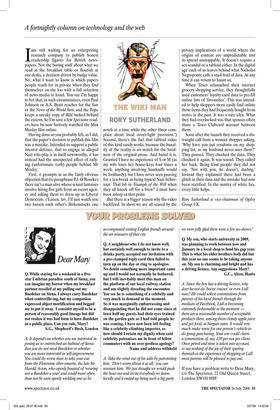I am still waiting for an enterprising research company to publish
honest readership figures for British newspapers. Not the boring stuff about what we read at the breakfast table or flourish at our desks, a decision driven by badge value. No, what I want to know is which papers people reach for in private when they find themselves on the loo with a full selection of news media to hand. You see I’m happy to bet that, in such circumstances, even Paul Johnson or A.S. Byatt reaches for the Sun or the News of the World first, and the Pope keeps a sneaky copy of Bild tucked behind the cistern. So I’m sure a few Spectator readers have by now furtively watched the Max Mosley film online.
Having done so you probably felt, as I did, that the paper’s decision to publish this film was a mistake. Intended to support a public interest defence, that to engage in alleged Nazi role-play is in itself newsworthy, it has instead had the unexpected effect of rallying (unfortunate verb) people behind Mr Mosley.
First, it prompts in us the fairly obvious objection that (to paraphrase P.J. O’Rourke) there isn’t a man alive whose sexual fantasies involve hiring five girls from an escort agency and asking them to dress up as Liberal Democrats. (‘Listen, luv, I’ll just watch you two loosen each other’s Birkenstocks one notch at a time while the other three complain about local street-light provision.’) Second, there’s the fact that tabloid video of this kind rarely works, because the banality of the reality is no match for the luridness of the original prose. And banal it is. Granted I have no experience of S or M (as my wife loses her house-keys four times a week, anything involving handcuffs would be foolhardy), but I have never seen pausing for a tea-break as being typical Nazi behaviour. That bit in Triumph of the Will when they all knock off for a brew? I must have been asleep at that point.
But there is a bigger reason why the video backfired. In short we are all scared by the privacy implications of a world where the origins of content are unpredictable and its spread unstoppable. It doesn’t require a sex scandal or a tabloid either. In the digital age each of us leaves behind what Nicholas Negroponte calls a snail-trail of data. At any time it can return to haunt us.
When Tesco relaunched their internet grocery shopping service, they thoughtfully used customers’ loyalty-card data to pre-fill online lists of ‘favourites’. This was intended to help shoppers more easily find online those items they had frequently bought from stores in the past. It was a nice idea. What they had overlooked was that spouses often share a Tesco Clubcard account between them.
Soon after the launch they received a distraught call from a woman shopper asking, ‘Why have you put condoms on my shopping list, as my husband never uses them?’ They paused. They checked the data. They checked it again. It was sound. They called her back. Being kind people they did not say, ‘Not with you, he doesn’t, darling.’ Instead they explained there had been a glitch in their data and the mistake had now been rectified. In the matter of white lies, every little helps.
Rory Sutherland is vice-chairman of Ogilvy Group UK.


























































 Previous page
Previous page